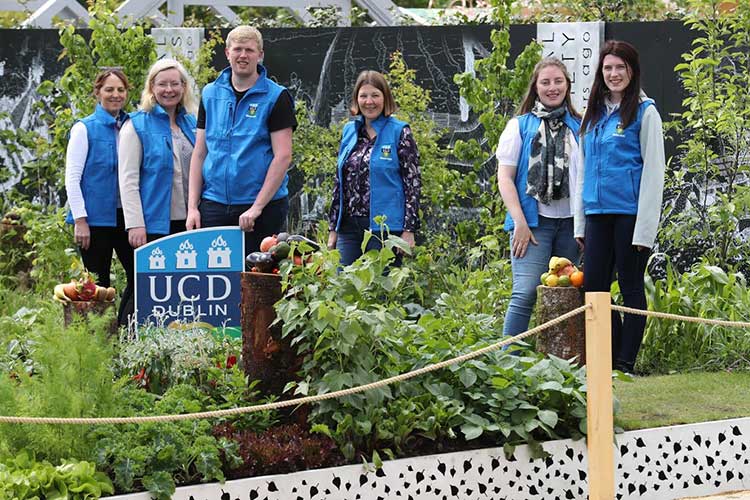Bloom-2019
Bloom 2019: A real taste of Ireland's food history

Cuisine is one of many things that define the cultural identity of a nation. The humble potato might be synonymous with Ireland but the Irish palette has historically enjoyed a wealth of ingredients steeped in history and heritage.
Countless influences have made their mark on Irish food over the past 8,000 years, and the impact of these key societal changes are illustrated by a garden created by a collaborative team from University College Dublin at this year’s (opens in a new window)Bloom festival.
The exhibit, titled ‘(opens in a new window)UCD History of the Irish Diet in Plants’, tells the story of the Irish diet from the early settlers to the introduction of farming, how tastes changed with the entry of imported foods, the impact of industrialisation, and the implications of the modern expansive diet.
The garden is divided into five sections based on societal developments that led to dramatic changes in the Irish diet. The chosen plants in each section primarily reflect evidence from archaeological science, highlighting changing food choices in Ireland over several millennia.
The five garden sections are:
- Early Settlers (8,000 years ago)
- First Farmers (5,700 years ago)
- Early Medieval (700 years ago)
- Industrial Society (200 years ago)
- Modern Day (21st century)
Along with fruits, vegetables and cereals, the garden includes pastureland to represent grass-fed animals (cattle, sheep and pigs), and ponds to depict early dependence on lakes for fish and plants.
UCD Landscape Architecture students John McCord, Ciaran Rooney, Hannah Johnston and Niamh Conlan designed the exhibit alongside (opens in a new window)Dr Caroline Elliott-Kingston, from the UCD School of Agriculture and Food Science, and (opens in a new window)Dr Meriel McClatchie, UCD School of Archaeology.
The earlier sections contain food plants that are now mostly considered weeds, such as fat-hen and nettles, along with early cereals and plants important in foraging such as crab-apple, hazelnut, berries and water-lily seeds.
Later sections include fruit and vegetables that are now familiar to modern shoppers.
One of the main objectives of the garden is to start a conversation on the implications of this transition from local to global, and how these changes have affected the Irish diet over time.
“An important change to note is that much of our early food was locally sourced or grown, while the most modern diet includes a wide variety and large volume of imported produce,” said the UCD team behind the garden.
“We now see more sugar consumption, more food miles, more processed food, more packaging, less fresh horticultural produce, and less home-grown, local produce.
"With few restriction in accessing global diet, are we healthier?”
The team added: "UCD is the leading national research centre for the archaeology of food and for modern agriculture and horticulture.
"Collaboration with students in Landscape Architecture has enabled us to design a Bloom Garden and tell the story of our food choices in Ireland, from ancient times to today."
(opens in a new window)Bloom 2019, the celebrated floral, food and family festival organised by Bord Bia, will feature 22 show gardens, 14 postcard gardens, 25 plant nurseries and over 100 Irish food and drink producers.
The 70-acre site at Phoenix Park is open to the public from Thursday, 30th May to Monday, 3rd June.
By: David Kearns, Digital Journalist / Media Officer, UCD University Relations.